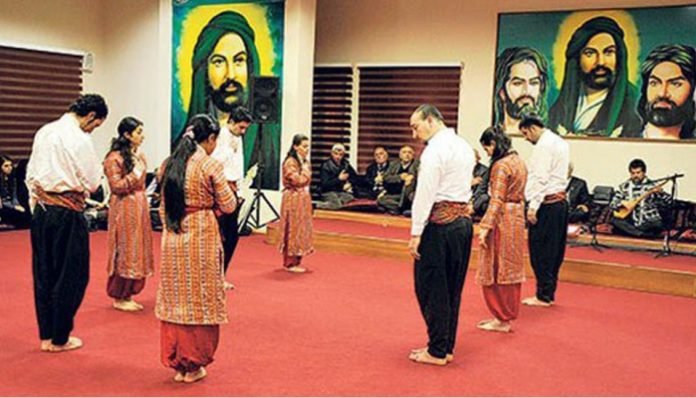The leader of Turkey’s far-right Nationalist Movement Party (MHP) on Tuesday called for the removal of barriers preventing the recognition of cemevis, Alevi houses of worship, as official places of worship, a longstanding demand of the country’s Alevi community, Turkish Minute reported.
Speaking at his party’s parliamentary group meeting, Devlet Bahçeli said cemevis should be treated with the same respect as mosques and urged greater understanding between Turkey’s Sunni and Alevi Muslims.
“With a clear conscience and sincerity, I say we are both Alevi and Sunni but above all, we are the Muslim Turkish nation,” Bahçeli said. “Our Alevi brothers and sisters are our own people. Their problems are our problems, their demands are our demands.”
He said attempts to politicize Alevi identity or detach it from its religious and cultural roots were misguided.
“A mosque belongs to us as much as a cemevi does. The cem ritual is ours, the semah dance is ours and the obligations of faith and Islam are ours,” Bahçeli said. “There is no benefit in clinging to taboos or maintaining artificial tensions.”
The cem ritual is a communal Alevi worship ceremony, while the semah is a traditional ritual dance performed during the ceremony.
Bahçeli urged the Turkish government to take bold steps to recognize cemevis as houses of worship, saying it was time to “remove obstacles one by one.”
“It is necessary to understand and respect our Alevi brothers and sisters who regard the cemevi as a place of worship,” he said.
The comments mark a rare call from Bahçeli, a key ally of President Recep Tayyip Erdoğan, to grant broader recognition to the Alevi minority, whose sites of worship remain unrecognized by the state.
Turkey has long denied the demands of Alevis, who are estimated to account for 12-15 million of Turkey’s population of 85 million, for state recognition, and cemevis are not officially recognized by the state and thus given no financial assistance.
There are estimated to be around 64 cemevis in İstanbul, while their number across Turkey is estimated to be more than 1,500.
Since cemevis are not officially recognized as houses of worship, Alevis complain about paying high energy bills and other costs related to the running of these places.
Although Erdoğan’s Justice and Development Party (AKP) government had launched an initiative called the “Alevi opening” in 2009, aimed at achieving a better understanding of the problems of Alevis through a series of workshops and enacting reforms based on that understanding, it failed to follow the recommendations in a report based on the outcome of the workshops and only took some symbolic steps. Such promises as officially recognizing cemevis and changing the law regarding compulsory religious education classes were not kept.
Hate crimes against Alevi communities are also common in Turkey. Cemevis have been occasionally vandalized, with curses and other insulting words put on their walls.















